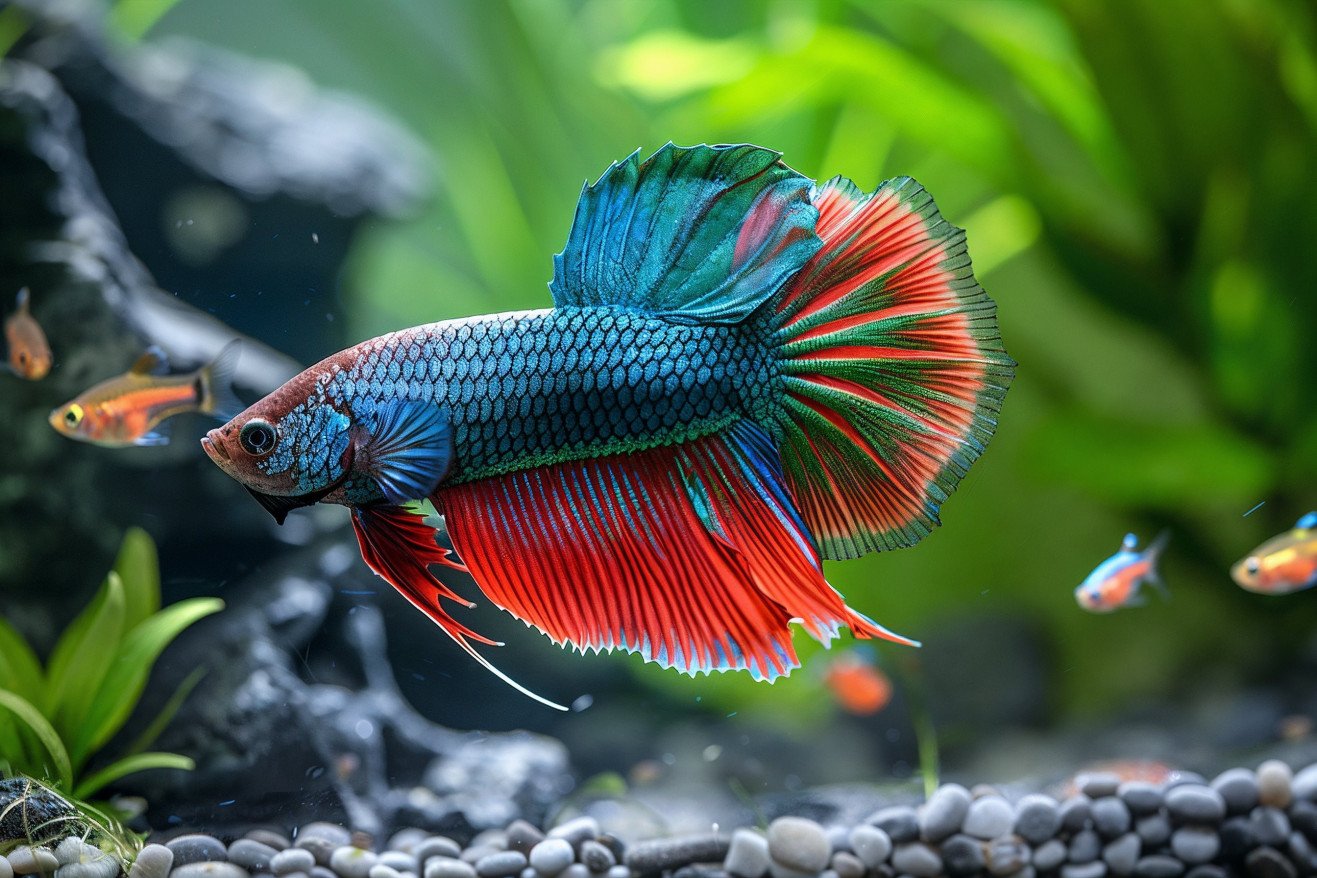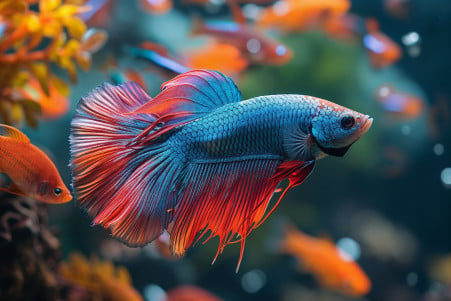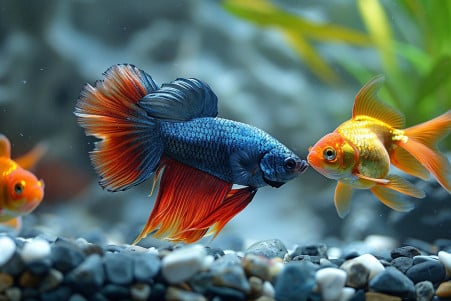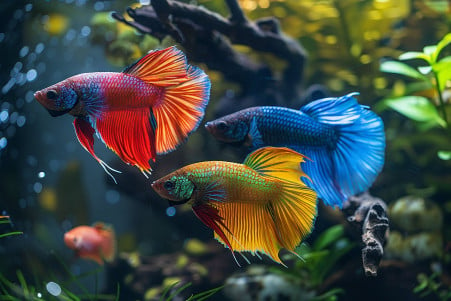Can Guppies Live With Bettas? How to Make Your Aquarium a Happy Place
1 March 2024 • Updated 1 March 2024

If you keep an aquarium, you’ve probably asked yourself whether guppies can live with bettas. While it is possible to keep guppies with bettas, there are some important caveats. To start, you’ll need a large tank with plenty of hiding places, and you’ll want to choose a female betta to reduce the risk of aggression.
Even then, you’ll need to keep a close eye on the tank, as male bettas may see guppies as threats and act territorially.
This article will take a deep dive into the world of fish compatibility, drawing on studies from marine biology, animal behavior, and aquarium keeping to assess whether guppies and bettas can coexist. It will cover the conditions that need to be met for guppies and bettas to live together successfully, as well as the behavioral and environmental factors that will help ensure a healthy, happy tank.
By the end of the article, you’ll know how to set up a tank that supports a peaceful community of guppies and bettas.
Can guppies live with bettas?
Understanding Betta Fish Aggression
Betta fish, or Siamese Fighting Fish, are well-known for their territorial aggression, especially between males. In addition to their vibrant colors and flowing fins, bettas are also known for their territorial behavior, which can make it difficult to determine if guppies are good tank mates. According to FishLab, this aggression is a result of the bettas’ territorial nature, which is important for protecting resources and finding mates.
Guppies, with their long, flowing fins, can trigger a betta’s territorial behavior because the betta may see them as a competitor. The Spruce Pets notes that bettas will flare their gill covers in a display that is both showy and threatening, which is a sign that a betta is about to become aggressive and is meant to intimidate other fish.
Other things that can make aggression worse include competition for food, environmental stress, and the presence of other brightly colored fish, which bettas may see as a threat.
It’s important to understand these triggers and set up a tank that will minimize stress and territorial behavior. This includes setting up a well-structured tank with plenty of hiding places and choosing tank mates that are peaceful and won’t trigger aggression. When these things are in place, and when the tank is stable and has plenty of room, betta aggression can be minimized, which can lead to a peaceful relationship between bettas and guppies.
Setting Up a Compatible Tank
One of the most important things to consider when setting up a tank for both guppies and bettas is making sure that the water conditions are right for both fish. Both guppies and bettas are tropical fish, so they require warm water. Bettas need water that’s between 76°F and 85°F, while guppies require water that’s between 74°F and 82°F, according to Aqueon and Micro Aquatic Shop.
This means that there’s a lot of overlap between the two species’ temperature needs, which is a good sign for keeping them together. In addition, bettas and guppies both like their water to be slightly acidic, with bettas needing a pH of 6.8 to 7.5 and guppies needing a pH of 6.8 to 7.8, and they have similar water hardness needs, according to Betta Care Guide and Guppy Water Temperature.
Larger tanks can help reduce aggression and stress, which can have a positive impact on behavior. A peaceful community tank should be at least 15 gallons, which will give the fish enough space to live together without constantly fighting, according to Aqueon.
The way the tank is set up is also important for maintaining peace in the tank: lots of live plants and hiding places can help diffuse betta aggression and give guppies places to hide.
Regular maintenance and observation are key to keeping fish healthy, so make sure to keep up with these tasks. This includes regular water quality tests and tank checks to make sure that the fish are doing well.
This is especially important when you’re first setting up the tank and adding fish to it. Once you’ve met these requirements, you can start to observe and learn about the social behaviors of guppies and bettas, including how guppies interact with their betta tankmates.
Guppy Social Behavior
Guppies have complex social systems and behaviors that play a role in their ability to cohabitate with other fish, including bettas. In fact, according to Behavioral Ecology, a paper by Alexander D.M. Wilson, guppies maintain their social networks even when their environment changes. This social stability could be good for a mixed-species tank because guppies with established social ranks have been shown to be less erratic, which leads to fewer confrontations.
That said, the social behavior of guppies also presents some potential issues. For example, a paper in Scientific Reports explains that guppies form stable, differentiated social bonds as a result of predation risk.
When guppies are in the same tank as a betta, the betta’s presence could cause these anti-predator social bonds to form. While this could help keep the guppies in line, it could also lead to increased aggression between the guppies and the betta, who the guppies may see as a predator.
As a result, it’s important to manage these social behaviors, and one way to do this is to introduce guppies to bettas slowly and to make sure the tank is heavily decorated with lots of hiding places, as a paper in PMC demonstrates.
In addition, it may be helpful to manage the guppies’ social interactions in a way that’s similar to how they manage them in the wild. For example, if the guppies are able to avoid confrontations with the betta in a way that’s similar to how they avoid predators in the wild, they may be more likely to cohabitate peacefully.
In general, it’s important to balance the guppies’ social needs with the betta’s territorial nature to make sure everyone is happy and healthy.
How to Keep Your Guppies and Bettas Stress-Free
In order to keep the peace in a community tank, it’s important to know the stressors that guppies and bettas face inside and out. According to REEF2REEF, some of the most common stressors for guppies and bettas are small tanks, poor water quality, and the presence of aggressive or incompatible tank mates.
Stress can manifest in physical symptoms, including swimming issues like darting and clamping, as well as external symptoms like color loss and loss of appetite.
In order to keep the peace in your tank, it’s important to work to eliminate stressors. As recommended by PetHelpful, this can include acclimating new fish properly to avoid shock, not overstocking the tank to limit competition, and making sure that the fish have a balanced diet.
It’s also important to make sure that the tank’s environment is stable. Regular water checks and keeping the tank at a consistent temperature can help prevent stress that comes from fluctuating water conditions, which BeChewy says is the number one cause of fish illness.
Most importantly, consistent and observant care will help keep the tank stress-free. By checking in on the tank daily, you can catch any potential issues early and address them before they become a problem. By keeping the tank stress-free, you’ll not only keep your guppies and bettas happy and healthy, but you’ll also make the most of your time in the aquarium hobby.
Coexisting in the Aquarium: Guppies and Bettas
In the fragile ecosystem of a home aquarium, guppies and bettas can coexist when certain conditions are met. This cohabitation is possible when aquarists take into account the behavior of each species, provide a large enough tank with plenty of hiding places, maintain the right water conditions, and keep the environment as stress-free as possible.
By controlling betta aggression and allowing for the guppies’ social nature, aquarists can make sure these beautiful fish live together in peace.
Aquarium hobbyists should always be willing to learn and change their care routines when necessary, with the goal of doing what’s best for their fish. A community tank, full of color and life, can be both rewarding and challenging.
It’s important to keep in mind that the best aquariums are built on patience, knowledge, and a willingness to do regular upkeep. When these factors are in place, the graceful interaction between guppies and bettas can be a beautiful sight in any aquarist’s tank.


